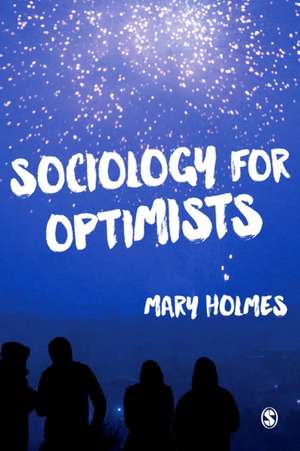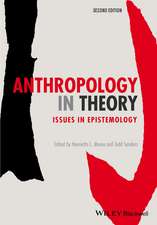Sociology for Optimists
Autor Mary Holmesen Limba Engleză Paperback – 2 oct 2016
From politics and inequality to nature and faith, Mary Holmes shows how a critical and optimistic sociology can help us think about and understand human experience not just in terms of social problems, but in terms of a human capacity to respond to those problems and strive for social change.
With contemporary case studies throughout grounding the theory in the real world, this is the perfect companion/antidote to studying sociology.
| Toate formatele și edițiile | Preț | Express |
|---|---|---|
| Paperback (1) | 158.27 lei 3-5 săpt. | +11.93 lei 5-11 zile |
| SAGE Publications – 2 oct 2016 | 158.27 lei 3-5 săpt. | +11.93 lei 5-11 zile |
| Hardback (1) | 747.59 lei 3-5 săpt. | |
| SAGE Publications – 2 oct 2016 | 747.59 lei 3-5 săpt. |
Preț: 158.27 lei
Nou
Puncte Express: 237
Preț estimativ în valută:
30.29€ • 31.54$ • 25.60£
30.29€ • 31.54$ • 25.60£
Carte disponibilă
Livrare economică 17 februarie-03 martie
Livrare express 01-07 februarie pentru 21.92 lei
Preluare comenzi: 021 569.72.76
Specificații
ISBN-13: 9781446268681
ISBN-10: 1446268683
Pagini: 176
Dimensiuni: 156 x 234 x 14 mm
Greutate: 0.27 kg
Ediția:First Edition
Editura: SAGE Publications
Colecția Sage Publications Ltd
Locul publicării:London, United Kingdom
ISBN-10: 1446268683
Pagini: 176
Dimensiuni: 156 x 234 x 14 mm
Greutate: 0.27 kg
Ediția:First Edition
Editura: SAGE Publications
Colecția Sage Publications Ltd
Locul publicării:London, United Kingdom
Recenzii
Sociology can be an inherently pessimistic discipline. After all, much still needs to be done for a fairer more equal society. Whilst she does not deny the distance we still have to go, Holmes argues for a more optimistic view of the social world, one which foregrounds how far we have come and imagines how things could be better. Questioning the overt focus on social problems opposed to social questions, she highlights how sociologists have pathologised social life and argues how we might see things differently. Taking a journey through a whole range of topics such as equality, relationships, freedom and even sociology, Holmes charts the history of core sociological ideas and begins to highlight the ways in which critical optimism can imagine new possibilities in the field. Arguing that pessimism limits the sociological imagination, Holmes provokes the reader to explore more optimistic ways forward through combining historical insight and provocation of new ways of thinking. This book would make a useful complement to any reading list to spark debates and research that explores the possibilities of a more optimistic future for sociology.
Cuprins
Preface
Chapter 1: Change
Chapter 2: Enjoyment
Chapter 3: Freedom
Chapter 4: Goodness
Chapter 5: Equality
Chapter 6: Relationships
Chapter 7: Nature
Chapter 8: Enchantment
Chapter 9: Optimism
References
Chapter 1: Change
Chapter 2: Enjoyment
Chapter 3: Freedom
Chapter 4: Goodness
Chapter 5: Equality
Chapter 6: Relationships
Chapter 7: Nature
Chapter 8: Enchantment
Chapter 9: Optimism
References
Notă biografică
Mary Holmes is a sociologist at the University of Edinburgh. Her research is in the areas of sociology of emotion, intimacy and relationships and political sociology. She has taught sociology in Scotland, Australia and New Zealand.
Her recent books include Distance Relationships: Intimacy and Emotions Amongst Academics and their Partners In Dual-Locations (Palgrave Macmillan, 2014) and Heterosexuality in Theory and Practice (with Chris Beasley and Heather Brook, Routledge, 2012).
Her recent books include Distance Relationships: Intimacy and Emotions Amongst Academics and their Partners In Dual-Locations (Palgrave Macmillan, 2014) and Heterosexuality in Theory and Practice (with Chris Beasley and Heather Brook, Routledge, 2012).
Descriere
Mary Holmes shows how an optimistic sociology can help us think about and understand social problems and positive social change. The perfect companion and/or antidote to studying sociology.







